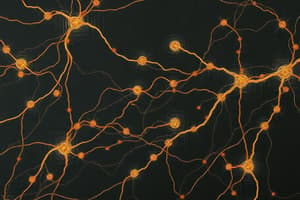Podcast
Questions and Answers
What is the electrical signal produced by neurons as they transmit information called?
What is the electrical signal produced by neurons as they transmit information called?
- Action potential (correct)
- Axon impulse
- Neurotransmitter
- Synapse signal
What is the term used to describe the event when sodium ions rush into the cell due to excitatory neurotransmitter binding?
What is the term used to describe the event when sodium ions rush into the cell due to excitatory neurotransmitter binding?
- Subthreshold event
- Depolarization (correct)
- Hyperpolarization
- Resting membrane potential
At what membrane potential does an action potential typically generate in neurons?
At what membrane potential does an action potential typically generate in neurons?
- -55mV
- -70mV
- -40mV
- -45mV (correct)
What type of potentials occur when the depolarization is not enough to reach the threshold for generating an action potential?
What type of potentials occur when the depolarization is not enough to reach the threshold for generating an action potential?
What type of ions primarily flow across the membrane during action potentials?
What type of ions primarily flow across the membrane during action potentials?
What initiates the depolarization phase of an action potential?
What initiates the depolarization phase of an action potential?
During which phase of an action potential does the membrane potential move towards 0mV?
During which phase of an action potential does the membrane potential move towards 0mV?
What is the resting membrane potential value typically around before depolarization occurs?
What is the resting membrane potential value typically around before depolarization occurs?
What process pushes the membrane potential back towards its resting state?
What process pushes the membrane potential back towards its resting state?
What occurs during the refractory period of an action potential?
What occurs during the refractory period of an action potential?
In skeletal muscle fibers, what triggers the release of acetylcholine into the synapse gap?
In skeletal muscle fibers, what triggers the release of acetylcholine into the synapse gap?
What opens voltage-gated sodium channels in muscle cells, initiating an action potential?
What opens voltage-gated sodium channels in muscle cells, initiating an action potential?
Flashcards are hidden until you start studying
Study Notes
Action Potentials
Action potential refers to the electrical signal produced by neurons as they transmit information from one part of the body to another. It involves rapid changes in voltage across a cell membrane that can be seen on an electrode recording or using other techniques. This process occurs when a neuron becomes excited and develops into a nerve impulse, which then travels along the axon to the next neuron. Let us delve deeper into understanding this phenomenon through its various subtopics.
Subthreshold Potentials
Before discussing action potentials, it is essential to understand subthreshold potentials. Neurons have a resting membrane potential due to the presence of ions inside and outside the cell. When an excitatory neurotransmitter binds to a receptor on the dendrites, the ion channels open, causing sodium ions to rush into the cell. This influx of positive ions causes a depolarization of the membrane potential from approximately -70mV to -55mV. If this depolarization is not enough to reach the threshold value for generating an action potential (-45mV), it is considered a subthreshold event.
Action Potentials
Now let us move on to action potentials. When the membrane potential reaches its threshold value (-50mV to -45mV), voltage-gated channels open, allowing the flow of ions across the membrane. The primary flow occurs via sodium and potassium ions.
Depolarization Phase
The opening of these channels begins the depolarization phase, where sodium ions rush into the cell. As more ions enter, the membrane potential moves towards 0mV. The depolarization phase is rapid and lasts only a few milliseconds.
Repolarization Phase
After the peak of the action potential has been reached, the voltage-gated channels close, and potassium ions start to flow out of the cell. This process pushes the membrane potential back towards its resting state. The repolarization phase is slower than the depolarization phase and can take tens of milliseconds to complete.
Refractory Period
Once an action potential has occurred in a neuron, it enters a period known as the refractory period. During this time, any subsequent stimuli applied would not be able to generate another action potential until the refractory period ends.
Action Potentials in Muscle Cells
While we have mainly discussed action potentials in neurons, they also occur in muscle cells. These electrical signals are responsible for contraction in muscles during movement. In skeletal muscle fibers, when a motor neuron generates an action potential at its axon terminal, calcium channels open, allowing calcium ions to enter. This influx in calcium leads to the release of acetylcholine from the synaptic vesicles into the synapse gap between the terminals and the muscle fiber's sarcolemma. Acetylcholine then binds to receptors on the muscle fiber surface, causing voltage-gated sodium channels to open, initiating an action potential within the muscle cell.
In summary, action potentials are crucial in transmitting information throughout the body via electrical impulses. Understanding subthreshold potentials, the generation of action potentials, and their phases (depolarization, repolarization, and refractory period) provides insight into their role in both neurons and muscle cells.
Studying That Suits You
Use AI to generate personalized quizzes and flashcards to suit your learning preferences.




